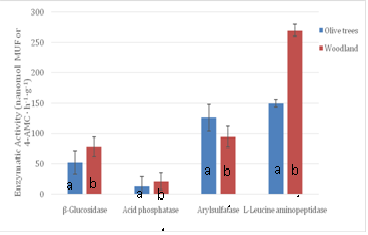María del Mar López-Rodríguez, Sergio Saia, Jessica Purswani, Clementina Pozo, Concepción Calvo, Tatiana Robledo-Mahón, Elisabet Aranda
Abstract
In Mediterranean ecosystems, agriculture faces significant challenges. Understanding the dynamics and diversity of microorganisms in arid lands is essential for improving soil quality and resilience to climate change. This study involves sampling 460 paired sites (two nearby locations with different land uses) across Spain, Croatia, Turkey, Greece, Tunisia, Morocco, France, and Italy, collecting topsoil samples (0–20 cm). While the study is still in its early stages, initial analyses have been conducted on a subset of samples, focusing on enzymatic activities. Microbiological analyses include: i) DNA-based massive sequencing, ii) phospholipid characterization (PLFA) for taxonomic identification, and iii) enzymatic activity assays to assess functional groups. Additional- ly, pesticide levels will be analyzed. The results show higher activities of β-glucosidase, acid phosphatase, and L-leucine aminopeptidase in woodland soils, possibly linked to a more diverse and active microbial community, less impacted by pesticide application compared to the olive tree farm. Conversely, lower arylsulfatase activity in woodland soils may be influenced by specific soil properties, such as the presence of rocks, which could affect sulfur cycling and enzyme function. This integrated approach will provide valuable insights into soil health across the Mediterranean basin.
